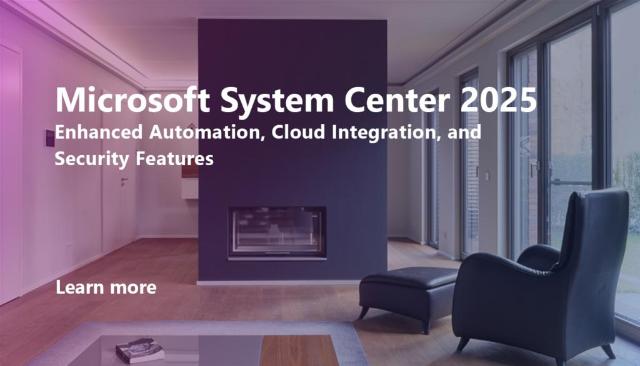Microsoft System Center 2025
Enhanced Automation, Cloud Integration, and Security Features
Microsoft System Center 2025, the latest version of its flagship suite for data center management, has been released on November 1. This new release continues to build on its established reputation for streamlining IT operations, with key improvements in automation, cloud integration, and enhanced security features that align with modern hybrid infrastructure needs.
Significantly Simplified IT Operations with SC 2025
Microsoft System Center 2025 represents a significant evolution in the company’s management suite, blending deeper automation with AI, improving cloud capabilities, and prioritizing security and compliance. Whether managing an on-premise, cloud, or hybrid environment, System Center 2025 is designed to help organizations simplify their IT operations, boost performance, and maintain robust security across their infrastructure.
Businesses planning to upgrade can now explore this feature-rich suite to optimize their IT management in today’s increasingly hybrid and multi-cloud world.
Key Updates in Microsoft System Center 2025
1. Expanded Automation and AI Capabilities
System Center 2025 places a strong focus on automation, further integrating artificial intelligence (AI) and machine learning (ML) to optimize IT operations. This update includes improved self-healing workflows, where the system can detect and fix issues without human intervention, reducing downtime and enhancing reliability across data centers. The AI-enhanced automation is designed to reduce manual workloads, speed up issue resolution, and help organizations manage large-scale infrastructure with greater efficiency.
2. Deepened Azure and Cloud Integration
With the growing shift to hybrid cloud environments, System Center 2025 offers tighter integration with Microsoft Azure. The new release makes it easier to manage and monitor workloads across on-premises infrastructure, private clouds, and public clouds like Azure. Enhanced Azure Arc support ensures that both on-prem and cloud-based resources can be controlled from a unified platform, offering seamless management and visibility of virtual machines, containers, and Kubernetes clusters.
For organizations leveraging multiple cloud environments, the new features allow for centralized management and better governance, including improved cost tracking and allocation across cloud resources.
3. Enhanced Security and Compliance Features
Security has taken center stage in System Center 2025, with improved vulnerability assessment tools built directly into the system. These tools provide real-time monitoring of IT environments, helping detect potential security risks and compliance issues. New role-based access controls (RBAC) allow administrators to define more granular permissions, minimizing the risk of insider threats or accidental misconfiguration.
The suite also includes native integration with Microsoft Defender for Cloud, offering a consolidated security posture across both on-premises and cloud infrastructure, ensuring that workloads are continuously protected against evolving cyber threats.
4. Unified Monitoring and Management Tools
System Center 2025 consolidates multiple monitoring tools, making it easier to track performance metrics and events across different environments. The newly improved Operations Manager provides deeper insights into application performance, with advanced reporting tools to visualize and predict potential bottlenecks before they impact service availability.
In addition, the updated Virtual Machine Manager (VMM) simplifies the management of virtualized environments, offering streamlined support for VMware vSphere, Hyper-V, and Azure Stack HCI platforms. This version also features improved disaster recovery and backup options through Data Protection Manager (DPM), ensuring critical workloads can be restored quickly.
5. Simplified Licensing and Subscription Models
Another highlight of System Center 2025 is the introduction of more flexible subscription-based licensing options. Microsoft now offers various subscription tiers, making it easier for enterprises of all sizes to scale their deployments based on specific needs. The new licensing structure also includes integration with other Microsoft cloud services, offering businesses more cost-effective ways to manage their hybrid infrastructure.
Extend System Center with Advanced Monitoring by NiCE
NiCE Management Packs for Microsoft SCOM
NiCE is a long-term Microsoft partner with significant expertise in Microsoft System Center, and especially Microsoft System Center Operations Manager (SCOM). With NiCE Management Packs for SCOM, organizations can effortlessly monitor diverse systems and applications, ensuring comprehensive visibility across their IT landscape.
Our powerful Management Packs enhance Microsoft SCOM by providing tailored monitoring solutions that adapt to your specific environment, whether on-premise, in the cloud, or hybrid. By integrating seamlessly, NiCE Management Packs empower IT teams to proactively manage performance, streamline operations, and achieve operational excellence. Learn more

